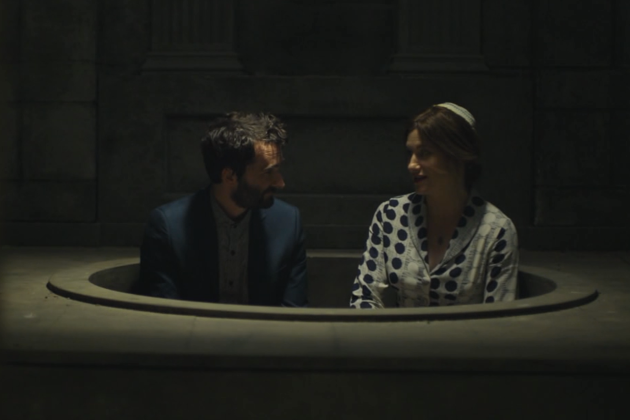Author Archives: Sarah Bunin Benor
February 29, 2016 by Sarah Bunin Benor
Have You Noticed These Images in “Transparent”?

Josh and Raquel in the empty mikveh.
“I didn’t want to throw you off with too much Jewiness on a first date.” This is Raquel, the rabbi in Jill Soloway’s series “Transparent,” telling her love interest, Josh Pfefferman, why she’s not wearing her yarmulke. It’s also the approach the writers take to the show. It has been described as “arguably the Jewiest television show ever,” but the “Jewiness” comes in gradually. The first few episodes portray the Pfeffermans as cultural Jews—discussing Jewish names, picking up their standing order at Canter’s Deli, donating old items to the “Hadassah League,” recalling a relative who died in Treblinka, and sprinkling a few Yiddish words into their English, like fakakta (shitty), keppie (head), and shaitel (wig).
But by the sixth episode, Jewish themes—some of them religious—come to drive the plot. We see a Shabbat dinner, complete with wine, challah, exchanges of “Shabbat shalom” and “Good Shabbos,” a no-cell phone rule, and a conversation about which tune should be used for lighting the Shabbat candles. We see a 13-year-old perform her Torah portion after her bat mitzvah is cancelled (Lech Lecha—the portion of Genesis about Abraham leaving home, a fitting symbol for the show’s theme of personal transitions). When a man dies, his body is wrapped in white shrouds and buried after the singing of El Malei Rachamim; the guests wash their hands before entering the shiva home, and the mirrors are covered. Season 2 includes a Jewish wedding and a Yom Kippur episode chock full of Jewish rituals—asking for forgiveness, tossing bread into a pond, and pounding their chests penitentially during the Al Chet prayer in synagogue. Characters reflexively kiss mezuzahs and discard cracked eggs with blood spots. Yiddish and Hebrew words become more prominent. And, in flashbacks to 1933, we see the Pfeffermans’ ancestors fleeing Berlin because of the Nazis’ rise to power.
- 2 Comments
 Please wait...
Please wait...